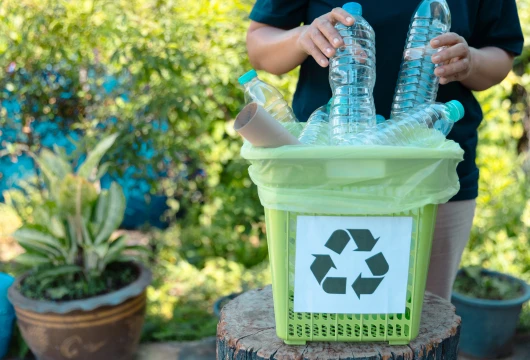MOU Signed to Enhance Skill Development in India’s Waste Management Sector
In a bold step towards strengthening India’s waste management infrastructure and promoting sustainability, the Rubber, Chemical, and Petrochemical Skill Development Council (RCPSDC) and Paripatram have signed a Memorandum of Understanding (MOU). This collaboration aims to drive skill development, formalize labor, and enhance sustainability within India’s fast-growing waste management sector.
With the country increasingly facing the challenges of electronic waste (e-waste) and the informal sector playing a significant role in waste handling, this partnership promises to make a substantial impact. As the nation strives to align with considerable sustainability goals, such as the Skill India and Clean India missions, this initiative is seen as a cornerstone in developing a skilled workforce that can address both the environmental and economic needs of the future.
Driving Sustainability through Skill Development
India is among the world’s largest producers of e-waste, representing both a challenge and an opportunity. Managing this waste effectively is critical for environmental sustainability and the health of communities, especially in areas where waste handling is still informal and hazardous. Through this partnership, the RCPSDC and Paripatram are set to formalize labor within the waste management sector, providing training and certification that will improve livelihoods and ensure safe and efficient handling of e-waste across the country.
Saif Mohammad, CEO of RCPSDC, expressed his optimism about the partnership. “This collaboration aligns with national missions like Skill India and Clean India. We are excited to partner with Paripatram to build a highly skilled and certified workforce in waste management, which is essential for India’s Vision 2047. We’re helping pave the way for a cleaner, more sustainable future by providing sustainable jobs and promoting inclusive economic growth.”
Sustainability at the Heart of India’s Future
India’s waste management sector is currently dominated by informal workers, who often lack the skills and resources to handle waste—particularly e-waste—safely and efficiently. This partnership aims to bridge that gap by integrating these informal workers into the formal economy and offering them access to skill development programs that will improve their safety and productivity while boosting their income potential.
According to Anwar Shirpurwala, Managing Director of Paripatram, formalizing the informal sector is crucial in ensuring successful waste management in India. “By partnering with RCPSDC, we are committed to equipping informal workers with the necessary skills and knowledge to manage e-waste responsibly and sustainably. This partnership will help workers and contribute significantly to India’s social, economic, and environmental development.”
The initiative will provide comprehensive training programs to equip workers with the technical knowledge and skills required for effective waste handling. These programs will be implemented in areas of high e-waste generation, including the country’s 100 smart cities, where sustainable solutions are urgently needed.
A Growing Sector with Tremendous Potential
India’s e-waste sector is expanding at an impressive Compound Annual Growth Rate (CAGR) of over 15%. This growth presents a significant opportunity for economic impact while addressing the mounting environmental challenge of electronic waste. The nation’s increasing dependence on electronic devices has led to a sharp rise in discarded electronic components, many of which contain harmful substances that pose risks to human health and the environment.
However, with the proper training and infrastructure, e-waste can be managed and become a valuable resource. This partnership seeks to unlock that potential by skilled workers to handle e-waste efficiently and sustainably. By creating a skilled workforce, India will be better equipped to address the growing challenge of waste management while fostering job creation and promoting social inclusion.
Shirpurwala further emphasized the importance of collaboration for sustainable waste management. “We cannot solve these complex environmental problems alone. Our partnership with RCPSDC allows us to leverage expertise, resources, and networks to create real change. Together, we are committed to upskilling the workforce and ensuring that waste management practices align with global sustainability standards.”
Promoting Inclusivity and Sustainable Employment
This initiative’s core is the commitment to fostering inclusive economic growth. The partnership will help informal workers access better employment opportunities in the growing waste management sector by formalizing labor and providing training programs. These workers, many of whom have been traditionally marginalized, will receive the tools they need to become part of the formal economy, ensuring that they benefit from the country’s rapid economic development.
The skill development programs will focus on waste management practices and prioritize workers’ safety and welfare. By improving working conditions and providing access to certifications, the initiative will ensure that workers can operate in a safer, more regulated environment. This approach will also help reduce the health risks associated with informal waste handling, often exposing workers to hazardous materials without proper protection.
Collaborative Efforts for a Sustainable Waste Management Workforce
India’s waste management sector is entering a critical phase as it positions itself as a global leader in sustainable development. The MOU between RCPSDC and Paripatram is a step towards addressing the challenges posed by the growing volume of e-waste while creating a more equitable and inclusive workforce.
By focusing on skill development, the partnership is helping India move closer to its Vision 2047 of becoming a sustainable, inclusive economy. The emphasis on formalizing the waste management sector aligns with the country’s broader goals of achieving net-zero emissions, improving public health, and fostering sustainable economic growth.
As the partnership progresses, it is expected to redefine the waste management landscape in India. The initiative sets a precedent for responsible, skill-driven solutions prioritizing the well-being of people and the planet.
A Model for Global Sustainability Efforts
The partnership between RCPSDC and Paripatram marks a turning point in India’s waste management sector. By promoting skill development, formalizing labor, and improving sustainability practices, this initiative is laying the groundwork for a future where waste management is safe, efficient, and inclusive. As India continues to navigate the complexities of sustainable development, collaborations like this offer a model for how countries worldwide can address waste management challenges while promoting economic growth and environmental stewardship.
For more in-depth analysis and inspiring climate news, click here.

